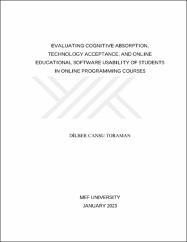Please use this identifier to cite or link to this item:
https://hdl.handle.net/20.500.11779/2089| Title: | Evaluating Cognitive Absorption, Technology Acceptance, and Online Educational Software Usability of Students in Online Programming Courses | Other Titles: | Çevrimiçi programlama kurslarında öğrencilerin bilişsel özümleme, teknoloji kabul ve çevrimiçi eğitim yazılımlarının kullanılabilirliğinin değerlendirilmesi | Authors: | Toraman, Di̇lber Cansu | Advisors: | Karahoca, Adem | Keywords: | Bilgisayar Mühendisliği Bilimleri-Bilgisayar ve Kontrol Computer Engineering and Computer Science and Control Yönetim Bilişim Sistemleri |
Publisher: | MEF Üniversitesi | Source: | Toraman, D. C. (2023). Evaluating cognitive absorption, technology acceptance, and online educational software usability of students in online programming courses = Çevrimiçi programlama kurslarında öğrencilerin bilişsel özümleme, teknoloji kabul ve çevrimiçi eğitim yazılımlarının kullanılabilirliğinin değerlendirilmesi, MEF Üniversitesi, Fen Bilimleri Enstitüsü, Bilişim Teknolojileri Ana Bilim Dalı, ss. 1-95 | Abstract: | Bu çalışmada, çevrimiçi programlama derslerinde öğrencilerin çevrimiçi kendi kendine öğrenme, bilişsel özümseme ve teknoloji kabul modellerini incelenmektedir. Bu tez, çeşitli faktörlerin programlama öğrencilerinin öğrenimindeki rolü ve etkisini tartışmıştır. Comp 109 Programlamaya Giriş (Java) dersi, Comp 110 Nesne Yönelimli Programlama dersi ve Comp 210 Veri Yapıları ve Algoritmalar derslerinin eğitsel öğrenmeye dayalı çevrimiçi ders içeriğinin öğrenci başarısı üzerindeki etkisinin araştırılmasının yanı sıra, öğrencilerin bilişsel özümseme, eğitsel çevrimiçi öğrenme ortamlarının kabulü ve kullanılabilirliği üzerindeki etkileri tartışılmıştır. Araştırmacı, belirtilmiş olan programlama derslerindeki yüz seksen bir öğrenciye anket araçlarının uygulamasını gerçekleştirmiştir. Anketlere dayalı olarak, bu araştırma, öğrencilerin bilişsel özümseme, teknoloji kabulü ve çevrimiçi eğitim yazılımı kullanılabilirliğinin programlama derslerindeki öğrencilerin öz düzenleme becerilerinin uzaktan eğitime uygun olup olmadığını incelemeyi amaçlamaktadır. Bu çalışmada test ölçümlerinde sırasıyla şu ölçekler uygulanmıştır: Bilişsel özümseme ölçeği (on üç madde), teknoloji kabul modeli (on dört madde), çevrimiçi eğitim yazılımı kullanılabilirliği modeli (otuz dokuz madde). İlgili anket araştırması hazırlığı; etik onayı, anketin uygulanması ve data analizi kapsamında üç ay sürmüştür. Bu anket çalışması, öğrencilerin çevrimiçi programlama derslerinde bilişsel özümseme, teknoloji kabulü ve online eğitim yazılım kullanılabilirliği ve online eğitime uygunluğunu değerlendirmektedir. Bu üç ölçeğin her biri, Cinsiyet, Ders Kodu, Bölüm, Yaş, Uzmanlık Alanı, İnternet Kullanım Sıklığı ve Teknolojiye İlgi olmak üzere yedi farklı açıdan incelenmiştir. Bu ölçümlerinin karşılaştırılmasında ve değerlendirilmesinde Normallik testi, ANOVA, Bağımsız T testi, Mann-Whitney U Test ve Kruskal Wallis Test kullanılmıştır. Bu test ölçümlerinin yanında çoklu değişken analizi için ayrıca MANOVA testi de uygulanmıştır. MANOVA testi 4 farklı açıdan detaylı olarak yapılmıştır. Bu ölçeklerin her birinin analizleri yedi farklı açıdan incelenmiş ve ilgili çalışmalarla karşılaştırılmıştır. Bunun sonucunda çevrimiçi programlama kurslarının bilişsel özümseme üzerindeki olumlu etkisi gösterilmiş oldu. Ancak, demografik değişkenler arasında anlamlı bir fark olmadığı da gösterildi. Bunlara uygun olarak her üç ölçek için tekrar literatür araştırması yapılıp tartışma yazıldı. Elde edilen tartışmaya ve analize göre de sonuçlar yazılmıştır. This thesis examines the online self-learning, cognitive absorption, and technology acceptance models of students in online programming courses. This thesis discussed the role and impact of various factors on the learning of programming students. Besides investigating the effect of the educational learning-based online course content of Comp109 Introduction to Programming (Java), Comp110 Object Oriented Programming ve Comp210 Data Structures and Algorithms courses on student success, the effects of students' cognitive absorption, the acceptance, and usability of educational online learning environments were discussed. The subjects of the research are a total of 181 online students in the student group. The researcher carried out the application of the questionnaire tools to the students in the programming courses. Based on the questionnaires, this research aims to examine the effect of students' cognitive absorption, technology acceptance, and online educational software usability on student success in programming courses. In this study, the following scales were applied in the survey measurements, respectively: Cognitive absorption scale (13 items), technology acceptance model (14 items), online educational software usability (39 items). The preparation, ethical approval and implementation of the relevant survey and data analysis research took three months. This study evaluates students' cognitive assimilation, technology acceptance, and e-education software usability scale and suitability for online education in online programming courses. Each of these three scales was examined from seven different perspectives: Gender, Course Code, Department, Age, Expertise, Frequency of Internet use, and Interest in technology. Normality test, ANOVA, Mann-Whitney U Test and Kruskal Wallis Test were used to compare and evaluate these measurements. In addition to these test measurements, the MANOVA test was also applied for multivariate analysis. MANOVA test was carried out in detail from 4 different perspectives. The results of each of these scales were investigated from seven different perspectives and compared with related studies, and suggestions were presented based on the obtained results. In line with my findings, the positive effect of online programming courses on cognitive absorption has been demonstrated. However, it was also shown that there was no significant difference between demographic variables. In addition to these, a literature search was made for all three scales for discussion and a discussion was written. Results are written according to the discussion and analysis. |
URI: | https://tez.yok.gov.tr/UlusalTezMerkezi/TezGoster?key=r4I1HnmXxFQovUpyAyUmxAw-MRbIy1e9eO77Zdj70Tr3GayytaoqhJ64944haaWM https://hdl.handle.net/20.500.11779/2089 |
| Appears in Collections: | FBE, Yüksek Lisans - Tez Koleksiyonu |
Files in This Item:
| File | Description | Size | Format | |
|---|---|---|---|---|
| Evaluating cognitive absorption, technology acceptance, and online educational software usability of students in online programming courses.pdf | Tez Dosyası | 1.95 MB | Adobe PDF |  View/Open |
CORE Recommender
Page view(s)
76
checked on Jan 13, 2025
Download(s)
38
checked on Jan 13, 2025
Google ScholarTM
Check
Items in GCRIS Repository are protected by copyright, with all rights reserved, unless otherwise indicated.